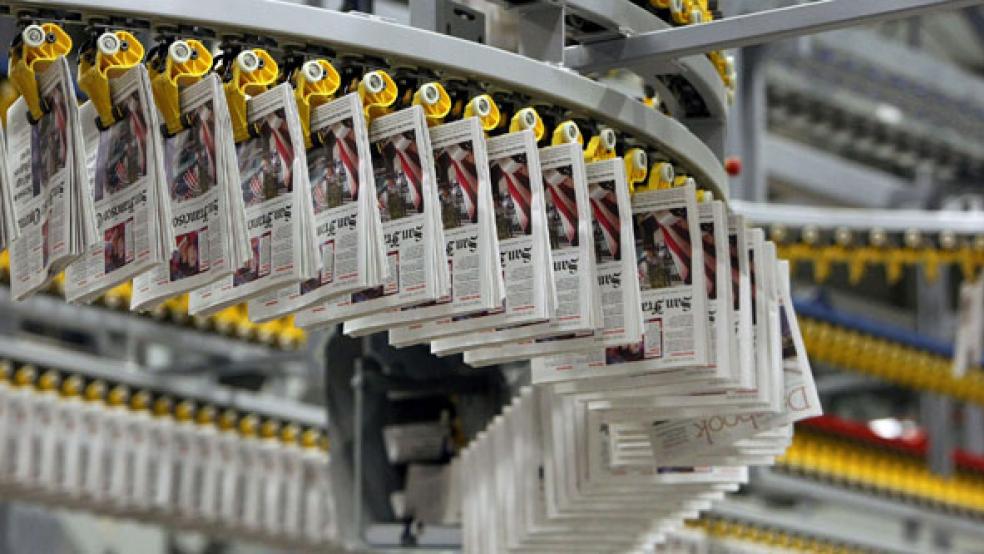Suddenly, the media ecosystem is chock full of intrigue, inspired by the deal-making frenzy that is sweeping through the beleaguered industry.
The drama now centers on this question about a new crop of potential saviors for the beaten-down newspaper industry: Can accomplished business and financial titans, who have established themselves in unrelated fields by innovating and thinking dynamically, transform publishers that have been given up for dead?
Think about it. John Henry acquired the Boston Red Sox and used modern computer analysis to help assemble a team of players good enough to win the franchise’s first World Series title in 86 years, in 2004 (for good measure the Sox won it all again three years later). Meanwhile, in Seattle, Jeff Bezos, once distinguished as Time magazine’s Person of the Year, has redefined the online retail universe by making Amazon into a model company.
On Saturday, Henry snapped up the moribund Boston Globe for a mere $70 million (The New York Times Co. bought it in 1993 for $1.1 billion). Then, on Monday, Bezos took over the Washington Post for $250 million in cash.
What do Henry and Bezos see that most of us are missing – those of us who might still lament that the digital revolution has so thoroughly disrupted the traditional, advertising-reliant newspaper industry that we grew up with?
Of course, it is possible that the savvy Henry views the Globe as an elaborate marketing tool to enhance the popularity and marketplace value of his “Saux” baseball team. And maybe Bezos envisions the Washington Post as a vehicle to enhance the prestige of Amazon. Or perhaps Bezos, who has achieved every financial reward imaginable, now wants to accept the challenge of reforming the woebegone newspaper industry. He certainly isn’t paying an exorbitant sum for the privilege: industry analyst Ken Doctor says newspapers today are worth around 10 percent of what they were a decade ago, according to The Economist.
There is, of course, another possibility: Ego. Only the owner of a successful local sports team can command comparable status in a given U.S. city. Henry and Bezos now stand as the white knights of Boston and Washington, respectively.
And there may be at least one new entrant. Speculation is rampant in New York that brash billionaire Mayor Michael Bloomberg is seriously eyeing a potential raid on The New York Times after he leaves office at the end of the year. Bloomberg brilliantly created and built an eponymous media empire before winning his first mayoral election in 2001 – so perhaps he could work his entrepreneurial magic on The Times, which sure could use a financial spark. And if Bloomberg didn’t win the “Grey Lady” he might gladly accept a sort of consolation prize in the form of the highly respected international newspaper, the Financial Times.
The titans of tech also have enough money to toy with a media investment. Chris Hughes, the co-founder of Facebook, is remaking The New Republic and garnering buzz if not profits. Could the Google Guys or any of Silicon Valley’s other media-savvy multimillionaires also see whatever it is Bezos does in the Washington Post?
It won’t be easy, even for a hard-charging mogul, to save a newspaper. The industry is just so woeful. Newspaper companies have failed to adjust their out of date, advertising-heavy business models. The Washington Post had a 14 percent decline in earnings during the second quarter of this year.
Merely throwing money at the problem won’t solve it. Newspapers have proven that. Rupert Murdoch paid the lavish sum of $5.6 billion for Dow Jones in 2007 so he could control The Wall Street Journal, giving him a new dimension of power and prestige in the U.S.
Murdoch made much of his fortune in newspapers around the world, but even he failed to make The Journal a financial juggernaut despite his efforts to widen its editorial coverage to general news. He recently placed Dow Jones in a separate, stand-alone company called News Corp., separating the print publishing business from faster growing media properties.
Then there was real estate tycoon Sam Zell. He talked tough but even he couldn’t turn around the Tribune newspapers, the Los Angeles Times and the Chicago Tribune, which commanded dominant positions in their biggest markets. And entertainment impresario Philip Anschutz didn’t thrive in newspapers in San Francisco and Washington.
Can the newspaper industry be saved? Is there hope now on the horizon? It will surely take some daring thinking. The new leaders have recognized that they must take approach the industry’s entrenched problem with cold, hard analysis.
“There is one thing I’m certain about: there won’t be printed newspapers in twenty years. Maybe as luxury items in some hotels that want to offer them as an extravagant service,” Bezos was quoted as saying last year.
What’s required now is something bold – an entrepreneur’s touch. To give hope to the newspaper industry, the new moguls – the John Henrys, the Jeff Bezos and, who knows, maybe the Michael Bloombergs and Eric Schmidts – have to drive innovation in the industry, as they did to the businesses that they created and nurtured so well.






